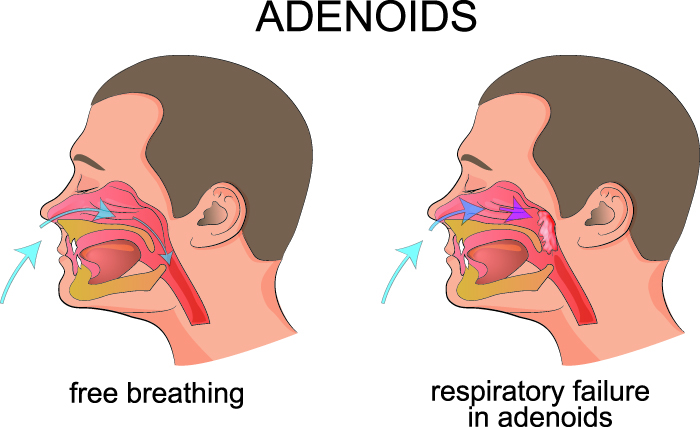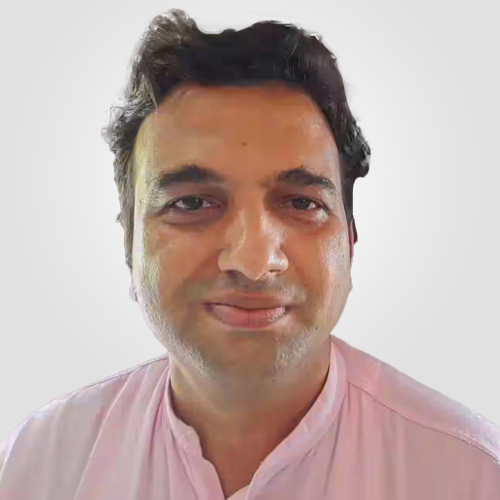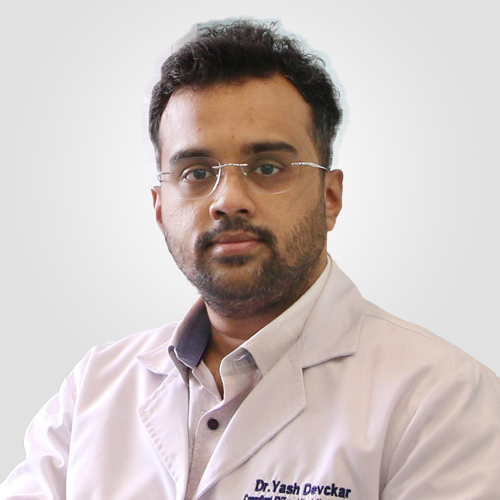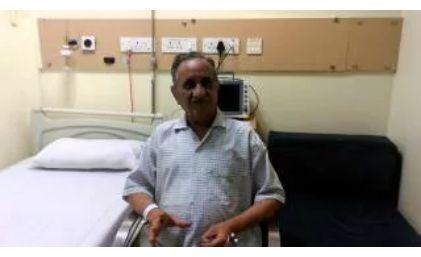Best Adenoidectomy Treatment & Diagnostics in Chembur, Mumbai
Adenoidectomy is a surgical procedure that removes adenoids that have become swollen or enlarged because of an infection or allergies. Chronic throat and respiratory infections result in inflammation of the tonsils and adenoids. Adenoidectomy specialists in Chembur perform tonsillectomy as well as adenoid removal.

What do we need to know about enlarged adenoids and adenoidectomy?
Adenoids are glands that are above the roof of the mouth, behind the nose. They resemble small lumps of tissue and play a vital role for young children. Adenoids are an immune system that enables the body to protect itself from viruses and bacteria. Any notable damage to the adenoid glands is a dangerous and crucial medical condition.
In some children, the adenoids get swollen and enlarged or they become infected. Some children are born with large adenoids.
Adenoids are like sponges and they absorb germs. Throat infection or associated infections causes an increase in the size of adenoids. Adenoids return to their natural size when you are healthy. However, it is not normal for adenoids to remain swollen or enlarged. Adenoid size decreases after the age of five, and they no longer play a crucial role in your health. Adenoid hypertrophy is an airway obstruction disorder characterized by adenoids that have grown in size. The medical terminology for infected and enlarged adenoids is adenoid hypertrophy.
Adenoidectomy removed enlarged adenoids.
What are the symptoms of adenoid enlargement?
Typical symptoms include:
- Throat discomfort
- A stuffy or runny nose
- A feeling as if they have clogged your ears
- Difficulties in sleeping and swallowing
- Neck glands swollen
- Obstructive sleep apnea (a condition that causes you to stop breathing for short periods while sleeping)
- Chapped lips or bad breath (because you have to breathe through your mouth)
Why are the adenoids removed?
Enlarged adenoids can block the eustachian tubes, which connect your middle ear to the back of your nose, and this makes breathing difficult. Some children are born with adenoids that are enlarged. Ear infections caused by clogged eustachian tubes can affect your hearing and respiratory health. Otolaryngologists evaluate the condition of enlarged adenoids that lead to the recurrence or return of ear infections and chronic fluid in the ear, which can cause temporary hearing loss. When adenoids swell up, they can obstruct the airway, causing problems.
When do you need to see a doctor?
If you detect problems with breathing or recurrent sinus infections or ear infections, consult adenoidectomy doctors in Chembur.
You can request an appointment at Apollo Spectra Hospitals, Chembur, Mumbai.
Call 1860 500 2244 to book an appointment.
How is adenoidectomy conducted?
Adenoidectomy specialists will perform the procedure under general anesthesia. They do this in an outpatient setting, so that your child can go home on the same day. The removed adenoids through the mouth. An adenoidectomy specialist will insert a small instrument into your mouth to prop it open. He or she will remove the adenoids by making a small incision or by cauterizing, which involves sealing the area with a heated device. Using gauze will prevent bleeding during the adenoidectomy procedure. The specialist will not unnecessarily use stitches during adenoidectomy. After adenoidectomy, the patient will be monitored in the recovery room. It takes one or two weeks to recover from adenoidectomy.
What are the risks of an adenoidectomy?
- Inability to address breathing issues, ear infections or nasal drainage
- Bleeding excessively, which is very rare
- Changes in vocal quality that are permanent
- Spread of infection
- Anesthesia-related risks
What are the precautions and diet after adenoidectomy?
It is normal to have a sore throat for two to three weeks after surgery. It is critical to drink plenty of fluids to avoid dehydration. Cold liquids and desserts can help soothe your throat.
While your throat is sore, doctors recommend the following foods and beverages:
- Fresh water
- Juices
- Dessert
- Ice cream
- Greek yogurt
- Pudding
- Soft vegetables
Conclusion
Because of frequent throat infections, adenoids can get enlarged. Adenoidectomy is a procedure that removes swollen and infected adenoids for relief.
While enlarged tonsils and adenoids can affect pitch, tone and vocalization, speech therapy can be tough while the tissues remain swollen.
Increased nasal congestion and drainage are common after adenoidectomy. In most cases, this will go away in seven to ten days. Following surgery, it is common to have fever for several days.
Adenoids, like tonsils, play a role in keeping your body healthy by trapping harmful bacteria and viruses that you inhale or swallow. For babies and small children, adenoids play a vital role as infection fighters. As they age, the body develops alternative ways to fight germs; they become less crucial.
Symptoms
Our Doctors
DR. RINAL MODI
BDS...
| Experience | : | 8 Yeras Experience |
|---|---|---|
| Speciality | : | Dental and Maxillofa... | Location | : | Tardeo |
| Timings | : | Mon - Sat : 10:00 AM... |
DR. DIPAK DESAI
MBBS, MS, DORL...
| Experience | : | 21 Yeras Experience |
|---|---|---|
| Speciality | : | ENT, Head and Neck S... | Location | : | Tardeo |
| Timings | : | Available by prior a... |
DR. ANKIT JAIN
MBBS, MS (ENT)...
| Experience | : | 14 Yeras Experience |
|---|---|---|
| Speciality | : | ENT, Head and Neck S... | Location | : | Tardeo |
| Timings | : | Mon, Wed, Fri : 4:00... |
DR. KEYUR SHETH
DNB (Med), DNB (Gast...
| Experience | : | 7 Yeras Experience |
|---|---|---|
| Speciality | : | General Surgery & Ga... | Location | : | Chembur |
| Timings | : | Mon to Fri : 2:00 PM... |
DR. MEENA GAIKWAD
MBBS, MS (ENT)...
| Experience | : | 8 Yeras Experience |
|---|---|---|
| Speciality | : | ENT, Head and Neck S... | Location | : | Chembur |
| Timings | : | Mon - Sat : 6:30 PM ... |
DR. PRASHANT KEWLE
MS (ENT), DORL...
| Experience | : | 17 Yeras Experience |
|---|---|---|
| Speciality | : | ENT, Head and Neck S... | Location | : | Chembur |
| Timings | : | Mon - Sat : 4:00 PM ... |
DR. ROSHNI NAMBIAR
MBBS, DNB (ENT)...
| Experience | : | 19 Yeras Experience |
|---|---|---|
| Speciality | : | ENT, Head and Neck S... | Location | : | Chembur |
| Timings | : | Mon - Sat : 12:30 PM... |
DR. SHASHIKANT MHASHAL
MBBS, MS (ENT)...
| Experience | : | 22 Yeras Experience |
|---|---|---|
| Speciality | : | ENT, Head and Neck S... | Location | : | Chembur |
| Timings | : | Friday : 8:00 PM to ... |
DR. YASH DEVCKAR
MBBS, MS (ENT)...
| Experience | : | 11 Yeras Experience |
|---|---|---|
| Speciality | : | ENT, Head and Neck S... | Location | : | Chembur |
| Timings | : | Mon - Sat : 9:30 AM ... |
DR. GANGA KUDVA
MBBS, MS (ENT) , DNB...
| Experience | : | 12 Yeras Experience |
|---|---|---|
| Speciality | : | ENT, Head and Neck S... | Location | : | Tardeo |
| Timings | : | Available by prior a... |
DR. JAYESH RANAWAT
MBBS, MS, DNB, FCPS...
| Experience | : | 16 Yeras Experience |
|---|---|---|
| Speciality | : | ENT, Head and Neck S... | Location | : | Tardeo |
| Timings | : | Available by prior a... |
DR. MITUL BHATT
MBBS, MS (ENT), DNB ...
| Experience | : | 12 Yeras Experience |
|---|---|---|
| Speciality | : | ENT, Head and Neck S... | Location | : | Tardeo |
| Timings | : | Mon - Sat : 2:30 PM ... |
DR. SHRUTI SHARMA
MBBS,MS(ENT)...
| Experience | : | 15 Yeras Experience |
|---|---|---|
| Speciality | : | ENT, Head and Neck S... | Location | : | Tardeo |
| Timings | : | "Mon - Fri : 11:00 A... |
DR. NINAD SHARAD MULEY
BDS, MDS...
| Experience | : | 9 Yeras Experience |
|---|---|---|
| Speciality | : | Dental and Maxillofa... | Location | : | Chembur |
| Timings | : | Mon - Sat : 9:00 AM ... |
Our Patient Speaks
Our Top Specialities
NOTICE BOARD
CONTACT US
CONTACT US
 Book Appointment
Book Appointment















.jpg)

.svg)
.svg)
.svg)
.svg)








